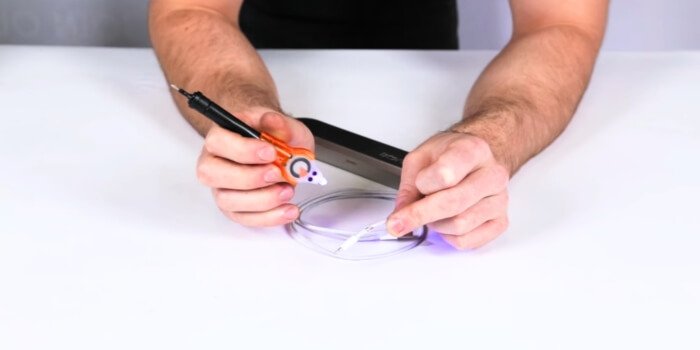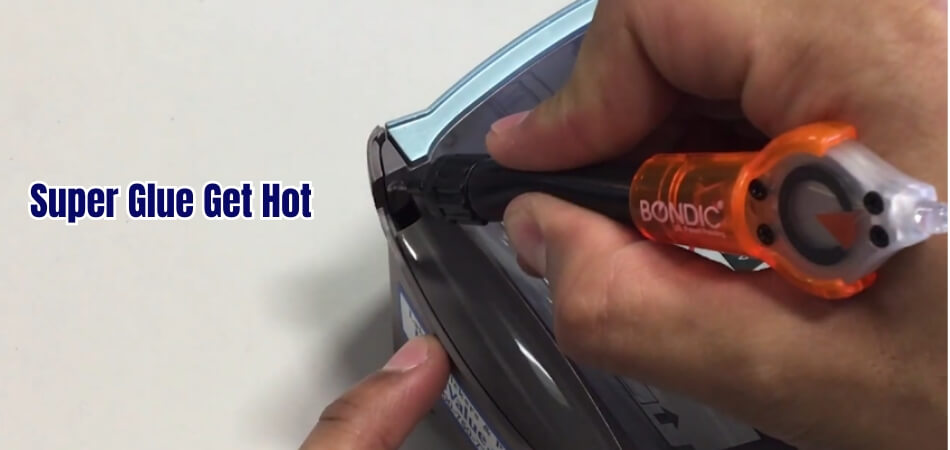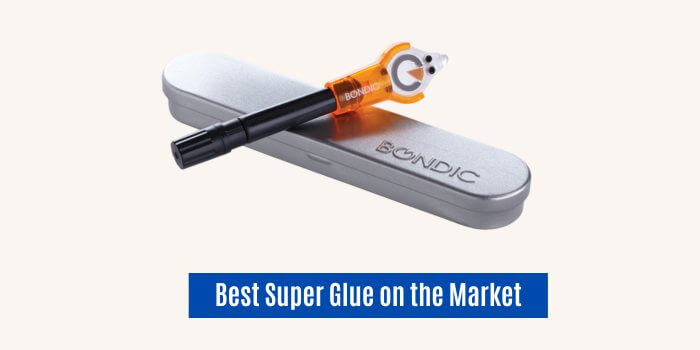Glue has proven to be a reliable ally in numerous projects and repairs. But have you ever wondered: Why does super glue get hot? This intriguing question explores the fascinating world of adhesive chemistry, uncovering the mysteries behind this common phenomenon.
When super glue is applied, it undergoes an exothermic reaction, releasing heat as it cures. This reaction is triggered by moisture, which is present in the air or on the surfaces being bonded. The heat generated helps accelerate the curing process, forming a strong bond quickly.
Do you want to learn more about how super works when it gets hot? Keep reading this article as we will explain this topic further, examining the intricate mechanisms that underline its remarkable adhesive capabilities.
What is Super Glue and How Does it Work?
Super glue, also known as cyanoacrylate adhesive, is a versatile bonding agent renowned for its rapid adhesion and strength. It works through a fascinating chemical process that begins upon application.

When exposed to even the slightest trace of moisture, such as ambient humidity or the moisture present on surfaces, the glue undergoes a polymerization reaction. This reaction generates heat and forms long, strong chains of molecules, quickly bonding the materials together.
This fast-acting nature makes super glue incredibly convenient for various applications, from repairing broken ceramics to assembling intricate models. Once applied, the glue sets within seconds, providing a firm bond that withstands considerable stress.
However, it's essential to handle super glue with care due to its quick-bonding properties. Accidental skin contact can result in fingers or other surfaces sticking together, requiring immediate attention.
Furthermore, proper ventilation is crucial when using super glue to avoid inhaling its fumes, which can irritate. By understanding how super glue works and following safety precautions, users can harness its adhesive power effectively while ensuring a smooth and hassle-free bonding experience.
Why Does Super Glue Get Hot?
When super glue is applied, it undergoes a fascinating chemical reaction known as polymerization. This reaction is triggered by the presence of moisture, whether it's from the surrounding air or the surfaces being bonded.

As the super glue comes into contact with moisture, the molecules in the glue start to link together rapidly, forming long chains and creating a strong bond between the materials being glued.
As this polymerization process occurs, it generates heat as a byproduct, resulting in the noticeable warmth when using super glue. This heat not only accelerates the curing process, allowing the glue to set quickly, but it also contributes to the strength and durability of the bond formed.
So, the next time you feel that warmth while using super glue, you can be assured that it's a sign of the adhesive effectively doing its job of creating a secure and long-lasting bond.
What is the Best Time to Use Super Glue?
When using super glue, timing is key to ensuring successful bonding in your projects. For that, understanding the best scenarios for its application can make all the difference in achieving strong and lasting results.
- Quick Repairs: Super glue is perfect for quick fixes around the house, such as repairing broken ceramics, fixing jewelry, or reattaching small parts. Its fast-drying nature allows you to swiftly mend items without the need for extended drying time.
- Crafting and Hobby Projects: Whether you're working on intricate models, assembling miniatures, or crafting jewelry, super glue provides precise and reliable bonding. Its ability to create strong bonds between various materials makes it a staple in crafting and hobbyist communities.
- Emergency Situations: Super glue is a handy tool to have in emergencies where immediate repairs are necessary. From temporarily fixing broken eyeglasses to repairing torn shoes, it can quickly come to the rescue when you need a fast solution.
- Woodworking: When working with wood, super glue can be used to bond small pieces together or fill in cracks and gaps. Its quick-drying formula and strong adhesion make it an effective option for minor woodworking repairs and projects.
- DIY Home Improvement: Super glue can be useful for various DIY home improvement tasks, such as securing loose tiles, fixing cabinet handles, or repairing trim molding. Its versatility and strength make it a go-to adhesive for small-scale household repairs.
- Model Making and Miniatures: Super glue's precise application and fast bonding make it ideal for assembling intricate models and miniatures. Whether you're building scale replicas or crafting miniature landscapes, super glue ensures secure and durable bonds between delicate components.
- Jewelry Repair: From reattaching loose gemstones to fixing broken clasps, super glue is commonly used in jewelry repair. Its ability to create strong bonds between metal, plastic, and other materials makes it a reliable choice for restoring valuable pieces.
Professional-quality results can be achieved by incorporating super glue into your projects at the right time.
The Best Super Glue on the Market
When it comes to super glue, Bondic stands out as a top contender in the market, renowned for its innovative features and superior quality. Unlike traditional liquid adhesives, Bondic utilizes a unique formula that sets it apart from the competition.

Here is why Bondic is the best super glue on the market:
Versatile Application
Bondic's unique liquid formula allows for precise application and adjustments before curing, making it perfect for intricate projects and repairs where accuracy is essential.
Superior Strength and Durability
Once cured, Bondic forms a resilient bond that can withstand significant stress and strain, providing long-lasting results for a wide range of applications.
Water and Heat Resistance
Bondic offers excellent resistance to water, heat, and other environmental factors, ensuring that your repairs remain intact even in challenging conditions both indoors and outdoors.
No Messy Residue
Unlike traditional liquid adhesives, Bondic leaves behind no messy residue, ensuring a clean and professional-looking finish on your projects without any unsightly drips or spills.
Extended Shelf Life
Bondic's innovative formula remains in a liquid state until activated by UV light, allowing for extended shelf life and multiple uses without the risk of drying out or hardening prematurely.
Safe and Odorless
Bondic is safe to use and odorless, making it ideal for indoor projects without the unpleasant fumes associated with traditional super glues, ensuring a comfortable and hassle-free bonding experience.
Overall, Bondic's innovative formula, precise application, strength, and durability make it a standout choice for professionals and DIY enthusiasts alike. With Bondic, you can tackle a wide range of projects with confidence, knowing that you're using a top-quality super glue that delivers exceptional results every time.
Frequently Asked Questions about Super Glue
Here are some frequently asked questions and their answers to shed light on this intriguing phenomenon.
Why Does Super Glue Get Hot When Applied?
Super glue generates heat during application due to an exothermic chemical reaction triggered by moisture. This reaction accelerates the curing process, forming a strong bond between surfaces.
Does the Heat Produced Affect the Bond's Strength?
No, the heat generated during the curing process doesn't compromise the bond's strength. In fact, it contributes to the adhesive's effectiveness by accelerating the bonding process and enhancing its durability.
Is It Normal for Super Glue to Feel Warm to the Touch?
Yes, feeling warmth when using super glue is entirely normal and indicates that the adhesive is curing as expected. This warmth is a result of the chemical reaction that occurs during the bonding process.
Can the Heat Harm the Materials Being Bonded?
Generally, the heat produced by super glue isn't enough to cause damage to most materials. However, it's essential to avoid excessive application to prevent any potential adverse effects on sensitive surfaces.
Why Does the Warmth Vary in Intensity During Application?
The intensity of the warmth can vary depending on factors such as the amount of glue applied, the ambient temperature, and the moisture content of the surfaces being bonded.
Does Heat Production Make Super Glue Dangerous to Use?
While the heat generated by super glue is noticeable, it's not typically dangerous to use. However, it's essential to follow safety precautions to avoid accidental skin contact and ensure proper ventilation.
Can I Speed Up the Bonding Process by Applying Heat?
While applying external heat might seem like a way to speed up the bonding process, it's unnecessary with super glue. The adhesive's exothermic reaction already accelerates the curing process efficiently.
Conclusion
Super glue getting hot is a fascinating aspect of its functionality, rooted in the chemical reaction it undergoes upon application. For that, understanding the science behind this warmth adds depth to our appreciation of this ubiquitous adhesive.
We gain insight into its efficiency and effectiveness in creating strong bonds by knowing that the heat is a byproduct of the glue's rapid curing process.
So, now you know Why does super glue get hot? And the next time you feel that warmth while using super glue, remember that it's a natural and expected occurrence, indicating that the adhesive is working as intended.






